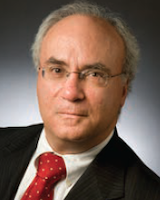PHILANTHROPIC PROFILES
Our alumni’s generosity underwrites the College of Law’s success. For many alumni, a tradition of lifelong giving is often tied to personal stories and fond memories of their alma mater. And what better time to reflect on their College of Law days than on the occasion of a class anniversary!
Here, alums celebrating years ending in one share their philanthropic journeys. Tell us yours by emailing us at SULaw@syr.edu.

Joseph M. DiOrio runs a boutique firm—DiOrio Law Office—in Providence, RI, with practice areas focusing on commercial finance, bankruptcy, and creditors’ rights. Before following his entrepreneurial calling in 2005, he worked for more than two decades at large firms.
In 2020, he was honored by the Hall of Fame of the Rhode Island Lawyers Weekly Excellence in the Law, receiving a special lifetime achievement award for senior leaders of the profession.
What brought you to study law?
It’s interesting. I majored in chemistry at Boston College. I feel very fortunate that BC had a strong liberal arts requirement. I was able to study much of the same material that those who studied political science or philosophy studied. As I considered my next steps, I felt my choices were to pursue a Ph.D. in organic chemistry or polymer chemistry or a law degree. My roommate and several others I knew were going to law school, and I wasn’t in love with chemistry. I thought law would be a good fit.
At the end of the day, working for a large chemical company that could relocate me and my family was not as appealing as earning a law degree, which would allow me to chart my own course. I found that option an exciting prospect—to control my own destiny—and it turned out to be true. At 22, making those decisions was dicey, but it turns out I was right.
What law school memories stand out?
In my experience, all the professors worked very hard in the classroom. Each had their own style, but each put great effort into teaching. They were enthusiastic. Reading the law was quite different from solving chemical equations. I was able to pick it up, and candidly it was easier for me than chemistry.
Also, my college roommate went to SU with me, and we made three other good friends. We all stay in touch to this day, 41 or so years later. We participated in intramural sports. Somehow, we ended up in the super league for intramural basketball and played against the football players’ team. We got crushed, but we had fun. Finally—a great strength of the school, and I think the University overall—is its diversity. There were people from all different backgrounds. That was a real positive.
Did a particular law professor have a lasting impact?
I got the book award in the future interests course. We studied the rule against perpetuates, which I understand has been abolished in every single state. Professor Samuel M. Fetters was brilliant as he described the machinations behind the rule—how it applied and didn’t apply. I enjoyed all my classes, but perhaps the thought process in his course was like organic chemistry, which resonated with me.
Why is philanthropy important to you personally?
Our charitable efforts go toward education. If I’m going to give, I give to my schools or the schools that educated my children. I wouldn’t say I’m a big donor, but I’m a consistent donor. Sometimes I give a little more, sometimes less depending on, say, whether we had to pay for my children’s college educations.
It’s important not to forget the value you received from your schools. Syracuse gave me the tools to become a lawyer, and I don’t want to forget that.
Do you have a message to recent graduates about giving back?
Don’t forget the value you receive from your education because it pays dividends all your life.
